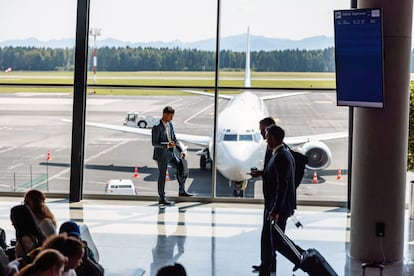The multinationals already cutting employees’ flights due to climate change
The Travel Smart campaign’s ranking analyzed 328 large companies and found that 85% do not have credible plans to reduce or replace air travel with train journeys or remote working


Aviation, the most polluting form of transportation, has continued to grow after the pandemic. Large companies play a key role in reducing this cause of global warming, given that business flights represent around 30% of aviation emissions in Europe, according to calculations by the environmental NGO Transport & Environment (T&E). The Tuesday, the body is launching its Travel Smart ranking, which analyzed 328 multinationals from Europe, India, and the United States and shows that 83% do not have credible plans to reduce business flights. However, some companies have already begun to reduce their employees’ flights — replacing them with train journeys or video conferences — forging ahead with decarbonization in the face of climate change.
“The ranking has assessed more than 300 corporations from three continents whose employees fly the most. It includes the 10 largest firms by market capitalization in each country and the largest in terms of employees,” says Helena Fortea, from Eco-Union, which is part of Travel Smart in Spain. “These companies are ranked based on a dozen indicators related to emissions from the estimated trips they make by airplane, their emissions’ reduction plans, and public reporting. Then they are given a grade, from A to D,” she continues.
Only 16 companies have achieved an A — five more than in the previous ranking — including Pfizer, AstraZeneca, HSBC, and Ericsson. What are they doing well? “The Dutch Arcadis is planning to reduce emissions from air travel by 50% per employee by 2025 compared to 2019 levels (the last pre-pandemic year), and is doing so by choosing the train by default for distances less than 450 miles, a policy that tries to arrange virtual meetings first, a carbon budget for international travel, and combining meetings to travel less, and with longer stays,” says Fortea.
Another positive example is Swiss Re’s, which also aims to reduce its emissions by 50% and has a control panel for real-time trips, which includes costs, emissions, and a kind of internal “tax” on flights. Additionally, each business unit has an individual travel carbon budget. Likewise, Spanish insurer Mapfre has set a credible emissions reduction target and intends to reduce corporate flights.
According to the study, based on annual sustainability reports and climate change questionnaires, only 57 of the 328 global companies have set targets to reduce emissions from business travel. Meanwhile, 44 companies have reported the total climate impact of their trips (which includes emissions other than CO₂), up from 40 last year.
Large multinationals
The document, which has been published for the third consecutive year since 2022, focuses on large multinationals such as Google, Microsoft, Amazon, Walmart, Johnson & Johnson, Danone, and Unilever, which get poor scores for their reluctance to limit their corporate air travel. Emissions from these 328 multinationals remain at levels 46% lower than in 2019, but the risk is that they will rise again.
“By not setting targets, they risk quickly returning to pre-Covid flying levels. [...] Companies that do not set objectives, such as Inditex, Johnson & Johnson, and Merck are close to their 2019 corporate travel levels again,” the T&E document notes. The report also criticizes streaming platforms like Netflix and Apple, which broadcast green messages about reducing emissions, but are among the 25 companies that fly the most globally, and have no plans to change it.
Why focus on large companies? “Although frequent flyers are less than 1% of the population, they fly constantly, so we estimate that they represent about 50% of aviation emissions. Many of them make business trips, which account for a third of total emissions. Companies have to set ambitious goals to lead the change,” says Fortea.
The campaign asks these companies to reduce their flights by 50% compared to 2019 levels. “Zero-emission planes and fuels will not arrive before 2030, so the only effective way to reduce emissions is to fly less,” it says. For this reason, they demand replacing flights with rail travel or virtual meetings. Governments can encourage this change by improving the competitiveness of rail travel, reestablishing night train routes that allow passengers to travel long distances at night or by increasing taxes on air travel. “It has been proven that on Madrid–Barcelona type routes [a distance of nearly 400 miles] with a frequent high speed train service, almost eight out of every ten travelers choose the train over the plane,” the Eco-union spokesperson summarizes.
Another idea to promote changes to people’s habits is to cut flights between cities for which there is a fast and reliable rail alternative, as France has done by eliminating air journeys with a rail alternative of less than two and a half hours. In Spain, governing socialist coalition partners PSOE and Sumar approved a non-legal proposal a few days ago to urge the Spanish government to do the same. The Ministry of Transport and Sustainable Mobility is carrying out a technical study to analyze whether the “rationalization of the use of short flights” could be a measure that “allows the reduction of air transportation emissions,” as well as other possible impacts of the initiative. For now, however, there has been no decision in this regard. As for night trains, the executive refuses to reinstate them because “they are deficient.”
In Spain, the air transportation sector doubled its emissions to 6.96 million tons of CO₂ in 2022 (the latest data available), according to the environmental consulting firm Global Factor.
Sign up for our weekly newsletter to get more English-language news coverage from EL PAÍS USA Edition
Tu suscripción se está usando en otro dispositivo
¿Quieres añadir otro usuario a tu suscripción?
Si continúas leyendo en este dispositivo, no se podrá leer en el otro.
FlechaTu suscripción se está usando en otro dispositivo y solo puedes acceder a EL PAÍS desde un dispositivo a la vez.
Si quieres compartir tu cuenta, cambia tu suscripción a la modalidad Premium, así podrás añadir otro usuario. Cada uno accederá con su propia cuenta de email, lo que os permitirá personalizar vuestra experiencia en EL PAÍS.
¿Tienes una suscripción de empresa? Accede aquí para contratar más cuentas.
En el caso de no saber quién está usando tu cuenta, te recomendamos cambiar tu contraseña aquí.
Si decides continuar compartiendo tu cuenta, este mensaje se mostrará en tu dispositivo y en el de la otra persona que está usando tu cuenta de forma indefinida, afectando a tu experiencia de lectura. Puedes consultar aquí los términos y condiciones de la suscripción digital.








































